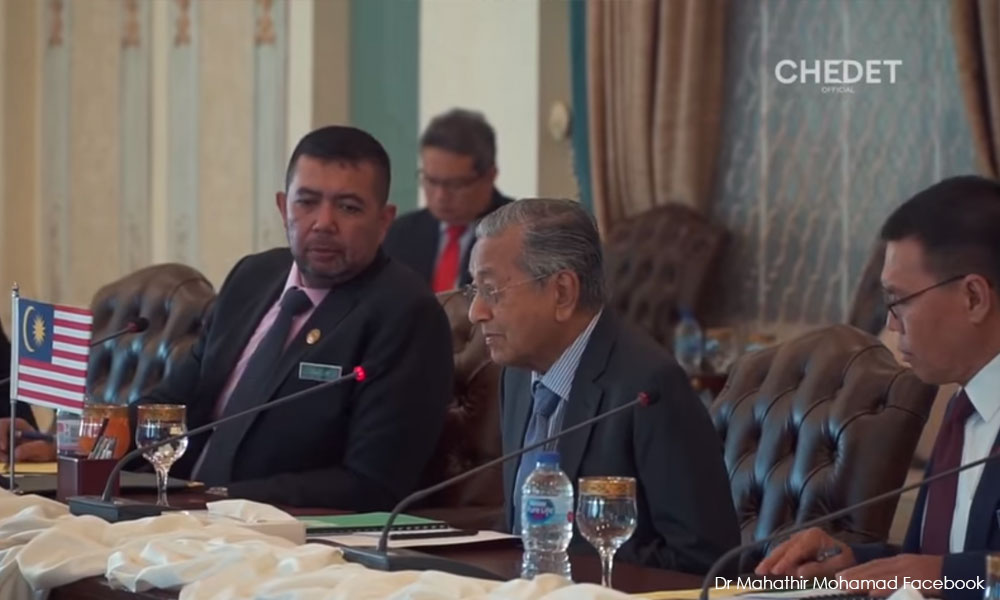
Published by The Star, image from Jack Board’s Twitter & The Star.
MALAYSIA’S storm of redefinition continues unabated. At every turn, we seem to be asking ourselves who we are as a nation, and who we want to be.
One of the primary questions in this debate concerns the role of race and religion in Malaysian politics.
I think it’s safe to say that a significant majority of people who might read articles like this would agree that lessening the role of race and religion in politics is a desirable direction.
Over the years, I have often said that Malaysia’s race-based political parties were anachronistic, and that almost nowhere else in the world of modern democracies could we find political parties organised so explicitly around race.
I used this as an argument in favour of moving away from the primacy of race-based parties in Malaysia, towards the global mainstream.
As thinkers and writers, we must admit when things don’t always pan out the way we predicted. Instead of my hope that Malaysia would follow in the footsteps of the rest of the world, one interpretation of global developments is that the rest of the world may be starting to follow in the footsteps of Malaysia – or at least the Malaysia of yesteryear.
An important distinction must be made between what we see happening around the world, and what we believe should be happening.
I believe that making race or religion a core principle of political organisation is deeply unhealthy, and that when Malaysia set down that path 60 years ago, it was the most important factor in the creation of a deeply divided society.

That, in my humble view, is the “should” of the matter. The “is” that we are seeing worldwide however, is the rising primacy of identity politics.
We live in the era of Donald Trump, Brexit, the rise of several European political parties that have anti-immigrant sentiment as a prime motivator, the so-called Islamic State terrorist group (IS), and so on.Just last week, we experienced a horrifying tragedy in New Zealand, perpetrated by a man apparently driven by racial supremacist ideology.
These phenomena can be described as the multi-polarisation of imagined communities, and the replacement of the moderate mainstream with a more extreme multi-stream.
A large part of this change is driven by what I call sensational gravity.
The context for sensational gravity is the manner in which media has evolved over the last few decades.
In short, we have moved from a scenario where practical and technological limits allowed for only a relatively limited number of newspapers, radio stations and television channels, to the era of the internet, where the space for publication is for all means and purposes entirely unlimited.
This also means that the space for public discourse can no longer be dominated or curated by a few, and is instead now in essence determined first and foremost by “virality”.
The qualitative difference this change engenders is hard to overstate, not least because viral content has a deep and abiding influence – not least in the world of politics.
The question then, especially for those looking to influence politics and votes, becomes understanding what content tends to drive and frame discussions.
Watching the rest of the world, one hypothesis is that the more extreme and sensational the statement, the more likely that statement will become the focal point for discourse. For example, think about the racist comments made by Nazri Aziz during the Semenyih by-election, that soon became a lightning rod of attention.
Sensational gravity thus describes the manner in which discourse and public attention tends to gravitate towards and orbit around content that is the most sensational and/or emotional.
In looking at Malaysian political actors today, one wonders if an understanding of sensational gravity has been fully internalised.
Many such actors, including the most well meaning ones, may still be reliant on methods and approaches that are more appropriate for the mainstream era – where a limited amount of content dominated public discourse.
A case study that might illuminate this point is a recent article written by Tun Daim Zainuddin, in which he articulately takes a no-holds barred approach to the question of whether the Malays are truly under threat.
I’m sure a great many people found themselves in deep agreement, and would have likely given Tun Daim a standing ovation had they heard the piece in person.
Perhaps Tun Daim is subtly targeting only a very select audience – the political intelligentsia for instance – who can sometimes instigate a trickle down effect of influence, especially if a particular theme is repeated in public discourse often enough.
If the article is indeed aimed directly at influencing the Malay masses however, as the content would seem to indicate, the effectiveness of his approach, however well intentioned, may be questionable.
Firstly, the article is written in English, and not Malay.
Secondly, as a writer myself, I suppose we should be conscious of the limits of (even the best) written articles, in the short attention span era of viral videos, infographics, and even gifs.
Of course, the medium of choice is not the only issue. A video of Tun Daim saying what he said in the article would be viewed and very well received by some quarters; but it doesn’t seem that ‘some quarters’ in this case would include the Malay masses.
The context for Tun Daim’s article is likely to be the ongoing effort by Umno and PAS to push the narrative that Malay and Islam are under threat in Malaysia.
This effort has many similar undertones and contours as various movements around the world portraying one group (usually identifiable by ethnicity, religion and such) as being under threat by another.
One reason why this narrative is so popular in so many places around the world is because it is easy to play up and harp on such fears. It is doubly easy for Umno and PAS, now that they are in the opposition, and are well positioned to cast aspersions on the “big, bad government”.
I imagine many within Pakatan are looking for ways to ‘counter’ the Umno/PAS narrative.
The first rule of political communication, however, is to never dance to your opponent’s tune. There is no doubt that an alternative narrative is necessary, but it may not be so clear whether or not addressing certain issues head-on is the most effective way to push said alternative narrative to the forefront of the discussion.
Replying directly to Umno and PAS may be a form of gravitating towards their sensationalised version of reality.
If the government and ruling party wish to create a more positive narrative that captures the imagination, one in which race and religion are no longer the defining issues of Malaysian politics, they may need to creatively find a sensational gravity of their own.
Nathaniel Tan is Director of Media & Communications at EMIR Research, an independent think-tank focused on strategic policy recommendations based upon rigorous research.

